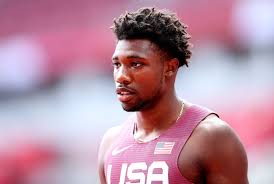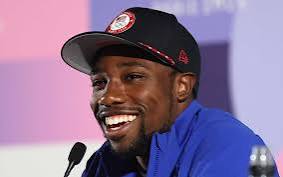Sports
Just ln:Controversy Erupts Over Lyles’ Statement About… see… more

The sporting world found itself embroiled in heated debate this week after a statement by American track and field champion Noah Lyles regarding a tennis player at the US Open sparked widespread backlash. Lyles, who recently won three gold medals at the 2023 World Athletics Championships, has been in the public eye for his bold commentary on various sports topics. However, his latest remarks have divided fans and athletes alike, highlighting the delicate balance of sports diplomacy.
The Statement That Sparked Outrage
During a recent interview, Lyles reportedly questioned the global recognition of a US Open tennis player, suggesting their success might not resonate internationally compared to his own achievements in athletics. He allegedly remarked that “while tennis enjoys a global platform, certain players only become household names during major tournaments.” The comment appeared to diminish the reach and impact of tennis players outside marquee events, raising eyebrows among tennis enthusiasts and players.
Lyles’ statement comes on the heels of his earlier controversial comments about NBA teams claiming the title of “world champions,” which had already sparked a fierce debate among basketball fans and players. His latest remarks were perceived by many as an extension of his broader critique of sports branding and recognition.
Reactions From the Tennis Community
Prominent figures from the tennis world were quick to respond. US Open semifinalist Jessica Pegula voiced her disappointment, stating, “Tennis players dedicate their lives to competing on a global stage. Our sport connects with millions worldwide, and to suggest otherwise is to overlook the passion and effort we bring to the court.”
Former world No. 1 Andy Roddick also weighed in on social media, defending the global impact of tennis: “Tennis is one of the most international sports. Every week, we compete in different countries, and fans around the world cheer us on. Lyles’ comments don’t reflect the reality of our sport.”
Fans took to social media platforms to express their views, with hashtags like #LylesVsTennis and #GlobalSports trending for hours. While some agreed with Lyles’ perspective, arguing that track and field often receives less recognition compared to other sports, others found his remarks dismissive and unnecessary.
Athletics Community Stands by Lyles
Support for Lyles came from his colleagues in the athletics community, who echoed his sentiments about the challenges faced by track and field athletes in gaining mainstream recognition. Olympic sprinter Allyson Felix defended Lyles, tweeting, “Noah’s comments highlight an important discussion about the visibility of athletes in different sports. Track and field deserves more attention, and it’s okay to have these conversations.”
Sports analysts also pointed out that Lyles might have intended to shed light on the broader issue of how certain sports overshadow others in terms of media coverage and global recognition. “His comments may not have been phrased diplomatically, but they raise a valid question about the global appeal and visibility of different sports,” said ESPN commentator David Lloyd.
The Broader Implications
The controversy highlights the ongoing tension between athletes from different disciplines as they strive for recognition and respect on a global scale. Lyles, known for his outspoken nature, has inadvertently reignited debates about the visibility of less commercialized sports like track and field, especially in comparison to tennis, basketball, and soccer.
As the US Open continues to captivate audiences, the focus remains on the tennis court, but the debate sparked by Lyles’ comments shows no signs of waning. With both sports communities rallying behind their respective perspectives, the incident underscores the broader conversation about fairness, recognition, and respect in the world of sports.
Conclusion
Noah Lyles’ statement about a tennis player at the US Open has sparked a firestorm of controversy, drawing both criticism and support from across the sporting world. Whether his comments were a fair critique or an unnecessary jab, they have reignited important discussions about the global visibility of athletes and the unequal recognition of sports. As the conversation continues, one thing is certain: the boundaries of sports diplomacy are being tested, and Lyles has once again proven himself to be a catalyst for debate.











